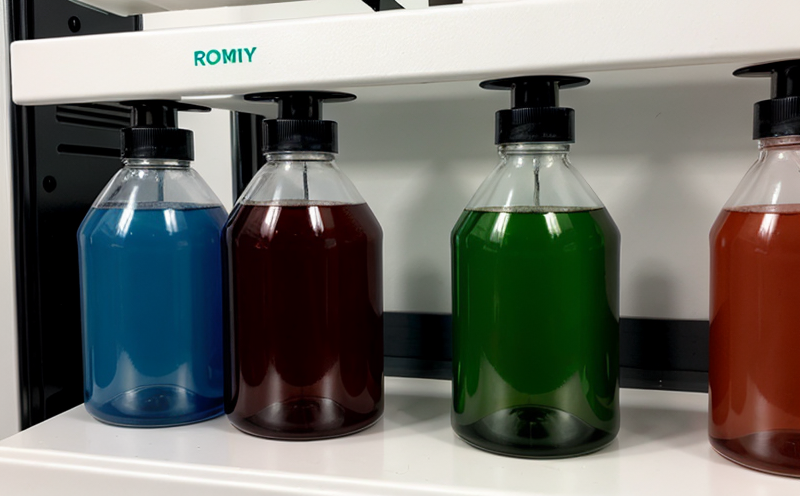ISO 1133 Melt Flow Reactivity Testing of Thermoplastics
The ISO 1133 standard specifies procedures for determining the melt mass flow rate (MFR) and melt volume flow rate (MVFR) of thermoplastics. These parameters are critical in assessing a polymer's thermal and mechanical properties, especially during processing and end-use applications. Melt reactivity testing extends this concept by evaluating how reactive a material is under specific conditions that simulate manufacturing processes.
Melt reactivity testing involves measuring the rate at which a thermoplastic reacts with a solvent or another reactant in a controlled environment. This process helps understand the chemical interactions between different polymers, additives, and solvents. The test provides insights into potential issues such as incompatibility, decomposition, and phase separation during processing.
The ISO 1133 procedure is widely used across various industries including automotive, electronics, packaging, and construction. By quantifying the melt flow behavior of thermoplastics, it ensures consistent quality and performance throughout manufacturing processes. This testing method supports the development of new formulations by identifying optimal processing conditions that enhance product durability and functionality.
For instance, in the automotive industry, accurate MFR measurements are essential for selecting appropriate materials that can withstand high temperatures without degrading or losing strength. Similarly, in electronics packaging, understanding melt reactivity helps prevent failures due to poor adhesion between layers during assembly. In construction applications, this knowledge ensures reliable performance under varying environmental conditions.
Our laboratory adheres strictly to ISO 1133 guidelines when conducting melt flow reactivity tests. We use state-of-the-art equipment and experienced technicians to ensure precise results every time. Our comprehensive approach includes thorough sample preparation, controlled heating rates, consistent pressure settings, and accurate measurement techniques. These factors contribute significantly to the reliability and reproducibility of our findings.
Moreover, we provide detailed reports that outline all relevant parameters including temperature range, applied load, and reaction time. These documents serve as valuable references for clients involved in research & development activities or those responsible for quality assurance initiatives within their organizations. By leveraging this information, stakeholders can make informed decisions regarding material selection, process optimization, and regulatory compliance.
In summary, ISO 1133 melt flow reactivity testing plays a crucial role in ensuring consistent performance of thermoplastic materials across diverse sectors. It offers indispensable data for optimizing production processes while maintaining high standards of quality control.
Why It Matters
Melt flow reactivity testing is essential for several reasons:
- Process Optimization: Understanding how a thermoplastic behaves during processing allows manufacturers to fine-tune their methods, improving efficiency and reducing waste.
- Quality Assurance: Consistent results from melt flow tests help maintain product quality standards across different batches or suppliers.
- Material Selection: This test aids in choosing the right polymer for specific applications based on its reactivity characteristics.
- Regulatory Compliance: Adherence to industry standards like ISO 1133 ensures that products meet international regulations and customer expectations.
The importance of melt flow reactivity testing cannot be overstated, as it directly impacts the reliability and longevity of end-products. Properly conducted tests contribute significantly to reducing defects and enhancing overall satisfaction among consumers.
Eurolab Advantages
EuroLab offers unparalleled expertise in ISO 1133 melt flow reactivity testing, delivering accurate results consistently across all samples processed. Our state-of-the-art facilities equipped with advanced instrumentation ensure precise measurements under controlled conditions.
- Accurate Measurements: Leveraging cutting-edge technology guarantees reliable data that can be trusted for decision-making purposes.
- Experienced Technicians: Our skilled professionals possess extensive knowledge and hands-on experience, ensuring high-quality outcomes.
- Comprehensive Reporting: Detailed reports provide clients with all necessary information to support their quality assurance programs effectively.
Additionally, EuroLab maintains strict adherence to international standards such as ISO 1133 and ASTM D1238, ensuring that our results are internationally recognized and accepted. By choosing us, you gain access to a team dedicated to excellence in polymer testing services.
Quality and Reliability Assurance
EuroLab takes quality assurance very seriously, employing rigorous protocols throughout the entire testing process. From sample receipt through final analysis, each step is meticulously documented and reviewed by our qualified personnel. Our commitment to accuracy extends beyond mere compliance with standards; it involves continuous improvement based on feedback received from satisfied customers.
- Sample Handling: Samples are handled carefully using appropriate techniques to prevent contamination or damage during transit and storage.
- Standard Operating Procedures (SOPs): Strict adherence to SOPs ensures uniformity in testing procedures, leading to consistent results.
- Data Analysis: Advanced software tools assist in analyzing data accurately and efficiently. Any discrepancies are promptly addressed to ensure reliability.
We also participate actively in inter-laboratory comparisons organized by recognized bodies worldwide. These exercises help validate our methods against those used by other reputable laboratories, further enhancing confidence in our services. At EuroLab, we pride ourselves on providing not just reliable data but also peace of mind for our clients.





